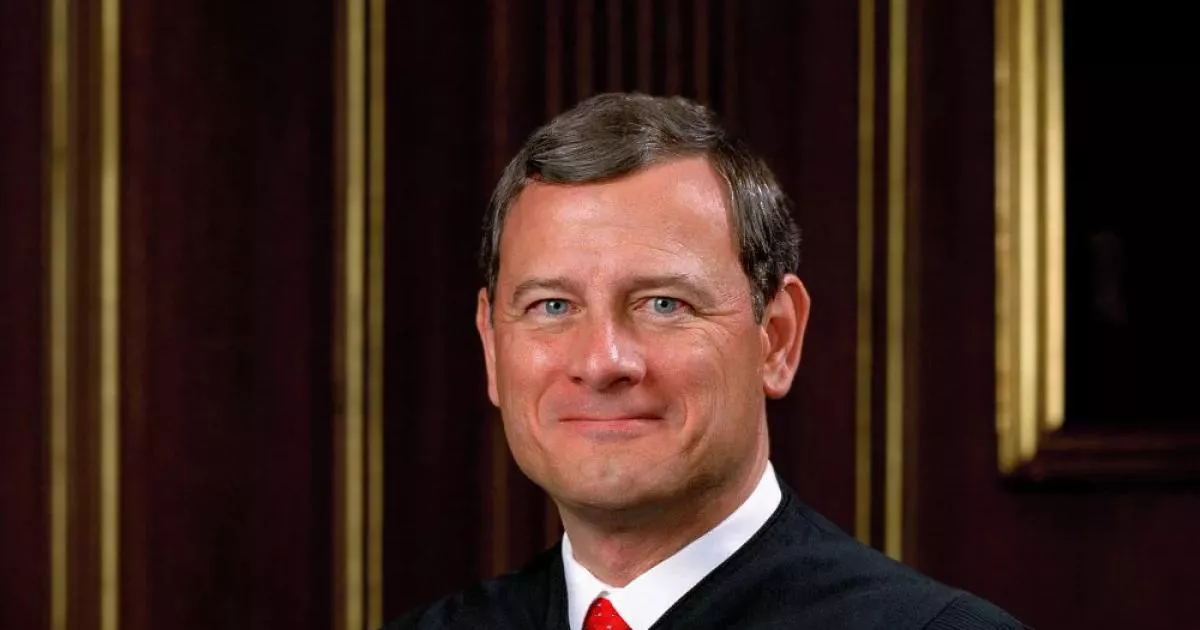John Roberts is the 17th Chief Justice of the United States, serving since 2005. Often described as a moderate conservative and an institutionalist, he is considered by some to be a swing vote on the Supreme Court. His tenure has coincided with a shift towards conservative jurisprudence, with Roberts authoring several key opinions. Although considered moderate, he has been pivotal in decisions that have shaped the legal landscape of the US.
January 27, 1955: John Roberts' birth
On January 27, 1955, John Glover Roberts Jr. was born. He would later become the 17th Chief Justice of the United States.
1965: Family moved to Long Beach, Indiana
In 1965, ten-year-old John Roberts and his family relocated to Long Beach, Indiana, where his father took on the role of manager at a new steel plant.
1965: Work on the Voting Rights Act of 1965
In his role as an assistant to the attorney general, John Roberts concentrated on the scope of the Voting Rights Act of 1965, particularly Sections 2 and 5, which he and other Reagan lawyers believed unnecessarily intruded on state regulations.
1973: Graduated as class valedictorian
In 1973, John Roberts graduated as class valedictorian from La Lumiere School, becoming the first graduate of the school to enroll at Harvard University.
1976: Received Bachelor of Arts degree
In 1976, John Roberts received his Bachelor of Arts degree in history, summa cum laude, with membership in Phi Beta Kappa.
1979: Law clerk for Judge Henry Friendly
From 1979 to 1980, after graduating from law school, John Roberts worked as a law clerk for Judge Henry Friendly at the U.S. Court of Appeals for the Second Circuit.
1979: Graduated from Harvard Law School
In 1979, John Roberts graduated at the top of his class with a Juris Doctor, magna cum laude, from Harvard Law School.
1980: Resolved to work under the Reagan administration
After the 1980 presidential election, John Roberts decided to work under the new Reagan administration.
1980: Clerkship for Justice William Rehnquist
In 1980, John Roberts began a clerkship for Justice William Rehnquist at the U.S. Supreme Court.
August 1981: Joined the Department of Justice
In August 1981, after being admitted to the District of Columbia bar, John Roberts arrived at the Department of Justice as a special assistant to the attorney general and helped Sandra Day O'Connor prepare for her confirmation hearings.
1981: End of clerkship with Rehnquist
In 1981, John Roberts concluded his clerkship with Justice William Rehnquist at the U.S. Supreme Court.
1982: Joined White House Counsel
In 1982, John Roberts was recruited by Reagan advisor Fred Fielding to work at the White House. He served as an associate with the White House Counsel.
1986: Entered private practice at Hogan & Hartson
In 1986, John Roberts transitioned to private practice in Washington, D.C., joining the law firm Hogan & Hartson as an associate, specializing in corporate law.
1989: Appointment in the Department of Justice
In 1989, John Roberts began serving in the Department of Justice during the Reagan and H.W. Bush administrations.
1989: Appointed Principal Deputy Solicitor General
In 1989, John Roberts was chosen by Ken Starr to join the George H.W. Bush administration as Principal Deputy Solicitor General, marking a significant step in his career.
June 27, 1990: Supreme Court decision in Metro Broadcasting, Inc. v. FCC
On June 27, 1990, the Supreme Court sided with the FCC in Metro Broadcasting, Inc. v. FCC, disagreeing with John Roberts' argument that racial preferences by the Federal Communications Commission were unconstitutional.
1991: Considered for Court of Appeals vacancy
In 1991, after Clarence Thomas was confirmed to the Supreme Court, John Roberts was considered a leading candidate to fill Thomas's vacancy on the U.S. Court of Appeals for the District of Columbia.
January 27, 1992: Nomination to D.C. Circuit
On January 27, 1992, President George H.W. Bush nominated John Roberts to the D.C. Circuit. However, the nomination lapsed without a Senate vote.
1992: Nomination to U.S. Court of Appeals
In 1992, President George H.W. Bush nominated John Roberts to the U.S. Court of Appeals for the District of Columbia Circuit, but the Senate did not vote on his confirmation.
January 1993: Returned to Hogan and Hartson
In January 1993, John Roberts returned to Hogan and Hartson, where he became a leading private Supreme Court litigator.
1993: Departure from the Department of Justice
In 1993, John Roberts left his position in the Department of Justice, transitioning to building a leading appellate practice.
1993: Suffered a Seizure
In 1993, John Roberts suffered a seizure, but an official Supreme Court statement indicated that a neurological evaluation "revealed no cause for concern."
June 1995: Supreme Court Overrules Metro Broadcasting, Inc. v. FCC
In June 1995, the Supreme Court overruled John Roberts's previous loss of Metro Broadcasting, Inc. v. FCC in Adarand Constructors, Inc. v. Peña.
July 27, 1996: Marriage to Jane Sullivan
On July 27, 1996, John Roberts married Jane Sullivan in the Cathedral of St. Matthew the Apostle. J. Michael Luttig was a groomsman at their wedding.
1996: Pro bono work for gay rights
In 1996, John Roberts contributed pro bono to gay rights activists in the landmark case of Romer v. Evans.
2000: Assisted George W. Bush in Florida
During the 2000 presidential election, John Roberts went to Florida to assist George W. Bush, showcasing his expertise and influence.
2000: Speculation as a potential Supreme Court nominee
When George W. Bush won the contested 2000 presidential election, journalists speculated about potential nominees for the Supreme Court, with Roberts remaining a strong candidate despite not being initially listed by Bush supporters.
May 9, 2001: Nomination to U.S. Court of Appeals
On May 9, 2001, George W. Bush nominated John Roberts to a seat on the U.S. Court of Appeals for the District of Columbia Circuit to replace Judge James L. Buckley.
May 8, 2003: Senate Confirmation to D.C. Circuit Court
On May 8, 2003, the Senate confirmed John Roberts to the D.C. Circuit Court by a unanimous voice vote, after the Judiciary Committee recommended him by a 16-3 vote supported by a bipartisan letter from over 150 members of the District of Columbia Bar.
2003: Supreme Court litigator
From 1993 to 2003, John Roberts was a leading private Supreme Court litigator, regularly appearing before the Supreme Court.
2003: Appointment to D.C. Circuit Court
In 2003, President George W. Bush appointed John Roberts to the D.C. Circuit Court, marking a significant step in his judicial career.
July 19, 2005: Nomination to the U.S. Supreme Court
On July 19, 2005, President George W. Bush nominated John Roberts to the U.S. Supreme Court to fill the vacancy that would be created by Justice Sandra Day O'Connor's retirement.
September 3, 2005: Death of Chief Justice William Rehnquist
On September 3, 2005, while John Roberts' confirmation as Associate Justice was pending, Chief Justice William H. Rehnquist died.
September 22, 2005: Senate Judiciary Committee Approves Roberts's Nomination
On September 22, 2005, the Senate Judiciary Committee approved John Roberts's nomination by a vote of 13-5.
September 29, 2005: Confirmation by the Senate and Taking Oath of Office
On September 29, 2005, the full Senate confirmed John Roberts, and he took the constitutional oath of office, administered by Associate Justice John Paul Stevens at the White House.
2005: Appointment as 17th Chief Justice of the United States
In 2005, John Roberts began serving as the 17th Chief Justice of the United States, marking a significant milestone in his career.
2005: Nomination and Confirmation as Chief Justice
In 2005, John Roberts was nominated by President George W. Bush to the Supreme Court, initially as an associate justice, but was then promoted to Chief Justice following the death of Rehnquist and was confirmed by the Senate.
2007: Seizure at Vacation Home
In 2007, Roberts had a seizure at his vacation home in St. George, Maine, and stayed overnight at a hospital in Rockport, Maine; doctors found no identifiable cause.
2007: Received Honorary Degree and Delivered Commencement Address at Holy Cross
In 2007, Roberts received an honorary degree from the College of the Holy Cross. He also delivered a commencement address at Holy Cross that year.
2007: Wrote majority opinion in Morse v. Frederick
In 2007, Roberts wrote the majority opinion in the student free speech case Morse v. Frederick, ruling that a student in a public school-sponsored activity does not have the right to advocate drug use on the basis that the right to free speech does not invariably prevent the exercise of school discipline.
April 20, 2010: Court struck down animal cruelty law in United States v. Stevens
On April 20, 2010, in United States v. Stevens, the Court struck down an animal cruelty law. Roberts, writing for an 8–1 majority, found that a federal statute criminalizing the commercial production, sale, or possession of depictions of cruelty to animals was an unconstitutional abridgment of the First Amendment right to freedom of speech.
March 2, 2011: Wrote the majority opinion in Snyder v. Phelps
On March 2, 2011, Roberts wrote the majority opinion in Snyder v. Phelps, holding that speech as a matter of public concern, even if considered offensive or outrageous, cannot be the basis of liability for a tort of emotional stress.
June 28, 2012: Wrote majority opinion in National Federation of Independent Business v. Sebelius
On June 28, 2012, Roberts wrote the majority opinion in National Federation of Independent Business v. Sebelius, which upheld a key component of the Patient Protection and Affordable Care Act by a 5–4 vote.
2013: Wrote majority opinion in Hollingsworth v. Perry
In 2013, Roberts wrote the 5–4 majority opinion in Hollingsworth v. Perry, which resulted in same-sex marriages resuming in California.
2013: Voted with majority in Shelby County v. Holder
In 2013, as chief justice, Roberts voted with the majority in the decision of Shelby County v. Holder, which struck down voting rights protections provided by the Voting Rights Act.
November 4, 2016: Deciding vote in execution stay
On November 4, 2016, Roberts was the deciding vote in a 5–3 decision to stay an execution.
2016: Voted to uphold abortion restriction in Whole Woman's Health v. Hellerstedt
In 2016, Roberts voted to uphold the law in Whole Woman's Health v. Hellerstedt, a case about abortion restrictions.
June 26, 2018: Majority Opinion in Trump v. Hawaii
On June 26, 2018, John Roberts wrote the majority opinion in Trump v. Hawaii, upholding the Trump administration's travel ban against seven nations.
November 2018: Response to President Trump's comments on "Obama judge"
In November 2018, John Roberts responded to President Donald Trump's comment about an "Obama judge", stating that there are no Obama, Trump, Bush, or Clinton judges.
2018: Joined liberal justices in declining to hear Planned Parenthood case
In 2018, John Roberts and Justice Kavanaugh joined four more liberal justices in declining to hear a case brought by Louisiana and Kansas to deny Medicaid funding to Planned Parenthood. This action let stand lower court rulings in Planned Parenthood's favor.
February 7, 2019: Part of majority rejecting inmate's request for imam during execution
On February 7, 2019, Roberts was part of the majority in a 5–4 decision rejecting a Muslim inmate's request to delay execution in order to have an imam present with him during the execution.
February 2019: Sided with justices to block execution of man with disability
Also in February 2019, Roberts sided with Kavanaugh and the court's four liberal justices in a 6–3 decision to block the execution of a man with an "intellectual disability" in Texas.
2019: Joined liberal justices in blocking Louisiana abortion restriction
In 2019, Roberts joined with liberal justices in a 5–4 decision to temporarily block a Louisiana abortion restriction.
February 5, 2020: End of First Impeachment Trial of Donald Trump
On February 5, 2020, the first impeachment trial of Donald Trump, over which John Roberts presided as Chief Justice, concluded.
June 21, 2020: Fell at Maryland country club
On June 21, 2020, Roberts fell at a Maryland country club; his forehead required sutures and he stayed overnight in the hospital for observation. Doctors ruled out a seizure and believed dehydration had made Roberts light-headed.
July 9, 2020: Majority Opinion in Trump v. Vance
On July 9, 2020, John Roberts wrote the majority opinion in Trump v. Vance, regarding presidential immunity from criminal subpoenas relating to the president's personal information, rejecting claims of absolute immunity.
October 2020: Joined justices in rejecting appeal from Kim Davis
In October 2020, Roberts joined the justices in an "apparently unanimous" decision to reject an appeal from Kim Davis, who refused to provide marriage licenses to same-sex couples.
2020: Increase in Voter Registration Purges After Shelby County v. Holder Decision
A 2020 study found that jurisdictions that had previously been covered by preclearance substantially increased their voter registration purges after the Shelby County v. Holder decision.
2020: Struck down Louisiana abortion law in June Medical Services, LLC v. Russo
In 2020, Roberts joined the majority in striking down a Louisiana abortion law in June Medical Services, LLC v. Russo. Though he disagreed with the precedent set in Whole Woman's Health v. Hellerstedt (2016), he cited stare decisis as his reason for joining the majority.
September 2021: Supreme Court declined to block Texas Heartbeat Act
In September 2021, the Supreme Court declined an emergency petition to temporarily block enforcement of the Texas Heartbeat Act, which bans abortion after six weeks of pregnancy except to save the mother's life. Roberts was in the minority.
November 2021: Voted to reject appeal from Mercy San Juan Medical Center
In November 2021, Roberts voted with the majority in a 6–3 decision to reject an appeal from Mercy San Juan Medical Center, which had sought to deny a hysterectomy to a transgender patient on religious grounds. The vote left in place a lower court ruling in the patient's favor.
2021: Death of elder sister, Kathy
In 2021, John Roberts' elder sister, Kathy, passed away, marking a personal loss for him and his family.
2022: Declined to join the majority opinion in Dobbs v. Jackson Women's Health Organization
In 2022, Roberts declined to join the majority opinion in Dobbs v. Jackson Women's Health Organization, which overturned Roe v. Wade. He wrote a concurring opinion supporting only the decision to uphold the Mississippi abortion statute.
June 29, 2023: Wrote majority opinion in Students for Fair Admissions v. Harvard and Students for Fair Admissions v. University of North Carolina
On June 29, 2023, Roberts wrote the majority opinion in Students for Fair Admissions v. Harvard and Students for Fair Admissions v. University of North Carolina, which held that race-based affirmative action in both public and private universities violates the Equal Protection Clause.
2023: Joined liberal justices in Allen v. Milligan
In 2023, Roberts joined the liberal justices in Allen v. Milligan, a 5–4 decision holding that Alabama's congressional redistricting plan violated Section 2 of the VRA. Writing for the majority, Roberts ruled that Alabama must draw an additional majority-minority district.
2023: Awarded the Henry J. Friendly Medal of the American Law Institute
In 2023, Roberts was awarded the Henry J. Friendly Medal of the American Law Institute.
July 1, 2024: Majority Opinion in Trump v. United States
On July 1, 2024, John Roberts wrote the majority opinion in Trump v. United States, regarding the extent of presidential immunity from criminal charges for official and unofficial acts while in office, outlining different standards for each.
Mentioned in this timeline

Donald John Trump is an American politician media personality and...

George W Bush the rd U S President - is...

The White House located at Pennsylvania Avenue NW in Washington...
The Affordable Care Act ACA also known as Obamacare is...
California is a U S state on the Pacific Coast...

Amy Coney Barrett is an American lawyer and jurist who...
Trending

Joe Montana nicknamed Joe Cool and The Comeback Kid is a Hall of Fame quarterback who played seasons in the...

7 months ago Deion Sanders excited to rejoin Colorado, praises Joey McGuire, addresses health concerns.

2 months ago Billy Strings Teases Spring 2026 Tour Dates and Shares Activity Sheet.

2 months ago Giants GM Defends Roster Amidst Struggles, Acknowledges Mistakes After Daboll's Firing

9 months ago Will Forte reflects on SNL, Alan Alda & Tina Fey reunite for Four Seasons.

Jeremiah O'Connell is a renowned American actor celebrated for his diverse roles in film and television His career spans from...
Popular

Thomas Douglas Homan is an American law enforcement officer who...

William Franklin Graham III commonly known as Franklin Graham is...

XXXTentacion born Jahseh Dwayne Ricardo Onfroy was a controversial yet...

Jupiter is the fifth and largest planet from the Sun...

Instagram is a photo and video-sharing social networking service owned...

KFC or Kentucky Fried Chicken is an American fast-food chain...
